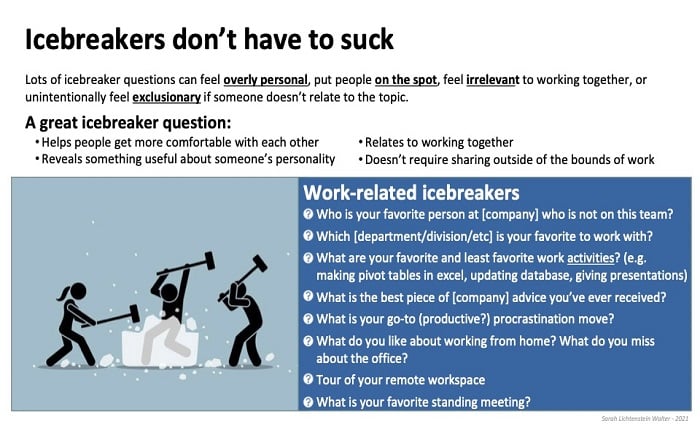Ice Breaker Questions: Engaging Conversations for Every Occasion

Introduction
Ice breaker questions are essential tools for initiating conversations in various social and professional settings. Whether you’re at a corporate meeting, a social gathering, or a team-building event, ice breaker questions can help ease the tension, foster connections, and create a comfortable atmosphere. Understanding and utilizing effective ice breaker questions can transform awkward silences into engaging dialogues.
By mastering the art of asking ice breaker questions, you can enhance your interpersonal skills, build stronger relationships, and make lasting impressions. This comprehensive guide will explore the different types of ice breaker questions, their benefits, and how to use them effectively in various scenarios.
The Importance of Ice Breaker Questions
Ice breaker questions play a crucial role in facilitating communication and creating a positive environment. They help participants relax, open up, and engage with one another, making them invaluable in both personal and professional contexts. The right ice breaker questions can break down barriers, promote inclusivity, and encourage collaboration.
In professional settings, ice breaker questions can lead to more productive meetings, improved team cohesion, and better problem-solving. In social situations, they can help strangers become friends and turn casual encounters into meaningful connections. Understanding the importance of ice breaker questions underscores their value in fostering communication and building relationships.
Types of Ice Breaker Questions
Ice breaker questions come in various forms, each suited to different contexts and objectives. Here are some common types of ice breaker questions:
- Personal Questions: These questions encourage participants to share personal information, such as their hobbies, interests, or experiences.
- Fun Questions: Light-hearted and entertaining, these questions are designed to make people laugh and create a relaxed atmosphere.
- Thought-Provoking Questions: These questions challenge participants to think deeply and share their perspectives on various topics.
- Team-Building Questions: Focused on promoting teamwork and collaboration, these questions help team members understand each other better.
- Topic-Specific Questions: Tailored to the context of the meeting or event, these questions relate to specific subjects being discussed.
By selecting the appropriate type of ice breaker question, you can achieve your desired outcomes and create engaging conversations.
Best Ice Breaker Questions for Meetings
Meetings can often start with a degree of formality and stiffness. Using ice breaker questions at the beginning of a meeting can help participants feel more comfortable and willing to contribute. Here are some effective ice breaker questions for meetings:
- “What’s one thing you’re looking forward to this week?”
- “If you could have any superpower, what would it be and why?”
- “What’s your favorite book or movie, and what do you love about it?”
- “If you could meet any historical figure, who would it be and why?”
- “What’s a recent accomplishment you’re proud of?”
These ice breaker questions can set a positive tone for the meeting, encourage participation, and foster a collaborative atmosphere.
Ice Breaker Questions for Team Building
Team building activities are essential for creating strong, cohesive teams. Ice breaker questions designed for team building can help team members get to know each other better, build trust, and improve communication. Here are some effective ice breaker questions for team building:
- “What’s the best team project you’ve ever worked on, and why was it successful?”
- “If our team had a theme song, what would it be?”
- “What’s one skill you bring to the team that you think is unique?”
- “Describe a time when you felt proud to be part of a team.”
- “What’s one thing you’d like to learn from a teammate?”
These questions can help uncover common interests, strengths, and experiences, fostering a sense of unity and collaboration.
Ice Breaker Questions for Social Gatherings
Social gatherings are perfect opportunities to use ice breaker questions to spark conversations and build connections. Whether you’re at a party, a networking event, or a casual get-together, these questions can help break the ice and get people talking:
- “What’s the most interesting place you’ve ever visited?”
- “If you could have dinner with any celebrity, who would it be and why?”
- “What’s your favorite way to spend a weekend?”
- “What’s the best concert or live event you’ve ever attended?”
- “If you could instantly become an expert in something, what would it be?”
These ice breaker questions are designed to be fun and engaging, helping participants find common ground and enjoy their interactions.
Ice Breaker Questions for Virtual Meetings
With the rise of remote work and virtual meetings, ice breaker questions have become even more important for fostering connections in a digital environment. Here are some ice breaker questions specifically tailored for virtual meetings:
- “What’s your favorite thing about working from home?”
- “Show us an item on your desk that has a special meaning to you.”
- “What’s the most recent show or movie you binge-watched?”
- “If you could work from anywhere in the world, where would it be?”
- “What’s your go-to snack during virtual meetings?”
These questions can help participants feel more connected and engaged, even when they are not physically together.
Ice Breaker Questions for Classroom Settings
In educational environments, ice breaker questions can help students feel more comfortable and engaged, promoting a positive learning atmosphere. Here are some effective ice breaker questions for classroom settings:
- “What’s your favorite subject and why?”
- “If you could have any job in the world, what would it be?”
- “What’s one thing you hope to learn this semester?”
- “What’s your favorite way to study or learn new things?”
- “What’s the best book you’ve ever read for school?”
These questions can help students open up, share their interests, and build rapport with their classmates and teachers.
Ice Breaker Questions for Workshops and Training Sessions
Workshops and training sessions often bring together participants from different backgrounds. Ice breaker questions can help participants feel more comfortable and engaged, enhancing the overall experience. Here are some effective ice breaker questions for workshops and training sessions:
- “What motivated you to attend this workshop?”
- “What’s one skill you hope to gain from this training?”
- “Share a fun fact about yourself that not many people know.”
- “What’s your favorite way to unwind after a busy day?”
- “What’s the best piece of advice you’ve ever received?”
These questions can help participants connect, share their goals, and create a positive learning environment.
Ice Breaker Questions for Family Gatherings
Family gatherings are great opportunities to use ice breaker questions to spark conversations and strengthen bonds. Here are some effective ice breaker questions for family gatherings:
- “What’s your favorite family tradition?”
- “What’s the funniest family memory you have?”
- “If you could travel anywhere with the family, where would it be?”
- “What’s one thing you’ve learned from a family member?”
- “What’s your favorite family recipe?”
These questions can help family members share their experiences, create new memories, and strengthen their relationships.
Ice Breaker Questions for Networking Events
Networking events are prime settings for using ice breaker questions to initiate conversations and build professional connections. Here are some effective ice breaker questions for networking events:
- “What brings you to this event?”
- “What’s the best career advice you’ve ever received?”
- “What do you enjoy most about your current job?”
- “What’s one thing you wish you had known when you started your career?”
- “If you could switch careers for a day, what would you do?”
These questions can help you engage with others, share insights, and build valuable professional relationships.
Conclusion:
In conclusion, ice breaker questions are powerful tools for initiating conversations, fostering connections, and creating positive environments in various settings. Whether you’re at a meeting, a social gathering, or a networking event, the right ice breaker questions can transform interactions and build meaningful relationships. By understanding the different types of ice breaker questions and how to use them effectively, you can enhance your interpersonal skills and make a lasting impact.
FAQs
1. What are ice breaker questions? Ice breaker questions are questions designed to initiate conversation and help people get to know each other better, creating a more comfortable and engaging environment.
2. Why are ice breaker questions important? Ice breaker questions are important because they help ease tension, promote communication, foster connections, and create a positive atmosphere in both personal and professional settings.
3. What are some examples of ice breaker questions for meetings? Examples of ice breaker questions for meetings include: “What’s one thing you’re looking forward to this week?” and “If you could meet any historical figure, who would it be and why?”
4. How can ice breaker questions be used in virtual meetings? In virtual meetings, ice breaker questions can be used to help participants feel connected and engaged by asking about their remote work experiences, favorite snacks, or recent shows they watched.
5. Can ice breaker questions be used in educational settings? Yes, ice breaker questions can be used in educational settings to help students feel more comfortable, share their interests, and build rapport with classmates and teachers. Examples include: “What’s your favorite subject and why?” and “What’s one thing you hope to learn this semester?”
Read more about: tallwin life




